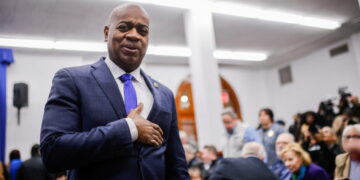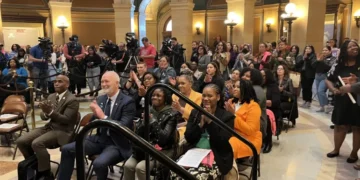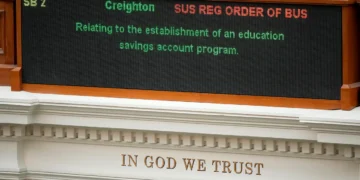March 24, 2025 Story by: Editor
Nine candidates are vying for the position of Oakland mayor, but former Council Member Loren Taylor and former Congresswoman Barbara Lee have emerged as the frontrunners in terms of financial backing and media coverage. Oakland voters will have the opportunity to rank multiple candidates on April 15, but these two contenders have the strongest chances of winning.
While both candidates share common ground on certain issues, they have distinct visions for the city’s future. In a recent debate, Lee emphasized her commitment to uniting the community, whereas Taylor focused on addressing Oakland’s systemic issues. Taylor advocates for greater self-sufficiency for the city, while Lee believes Oakland should actively secure its fair share of state and federal resources.
Beyond these broad ideological differences, Taylor and Lee also diverge on key policy matters.
Public Safety
Both candidates support initiatives to improve public safety in Oakland. They agree on the need to fully staff the city’s 911 call center and continue funding the anti-gun violence program Ceasefire. Additionally, they advocate for a strategy that balances traditional policing with violence prevention and intervention programs. However, their specific approaches differ.
Taylor and Lee both favor increasing the number of police officers in Oakland but disagree on the exact target.
- Lee has proposed increasing the Oakland Police Department (OPD) force to 850 officers, though she acknowledges that achieving this goal will take time. She supports using Measure NN to reach 700 officers and proposes a partnership with Merritt College to recruit qualified candidates for OPD. Additionally, she advocates for housing options that would allow first responders to live within the city.
- Taylor aims to bring OPD staffing to 800 officers through increased funding for police academies and improved recruitment and retention efforts. His plan includes lateral hires from other departments and reinstating retired officers. At a forum, he stressed that retaining current officers is as important as recruiting new ones.
Both candidates have suggested potential revisions to OPD’s vehicle pursuit policy, though neither has provided extensive details.
- During a debate, Lee stated, “Maybe that policy needs to be revised,” while acknowledging the risks involved in police chases. She added, “We know people do get killed and hurt behind police chases, so I’m not saying get rid of it, but I think we need to come up with a framework that allows those who are coming into Oakland to know there’s a consequence for doing what they’re doing.”
- Taylor, in a questionnaire, said he would support “modifications of OPD’s pursuit policy to lessen restrictions on holding officers accountable.” In February, he introduced the “Smart Pursuit Plan”, advocating for drones and other technology to assist officers in vehicle pursuits. He stated in a press release, “Whether it be by an officer or drone, all crimes must be pursued.”
The candidates also differ on their stance toward MACRO (Mobile Assistance Community Responders of Oakland), a program designed to provide non-police responses to crises.
- Taylor, in a recent social media post, expressed concerns about MACRO’s effectiveness, writing, “Either (MACRO) delivers on its mandate, we establish a new mandate it delivers to, or we cancel future investments.” He has suggested refocusing MACRO on its original goal—diverting 911 calls away from OPD.
- Lee, in questionnaires and on her website, has advocated for expanding MACRO and mental health crisis response programs. She has also proposed shifting traffic enforcement for minor infractions away from armed officers and continuing efforts to enhance pedestrian safety through infrastructure improvements.
Oakland’s Budget Crisis and the Local Economy
Both Taylor and Lee recognize the city’s financial challenges and agree that it was a mistake to link the sale of the Oakland Coliseum to the budget. They also support hiring an independent financial expert to review the city’s finances and have pledged to enhance security in commercial districts. Furthermore, both back Measure A, which would increase Oakland’s sales tax from 10.25% to 10.75%.
However, they differ on spending priorities and city employee management.
- Taylor wants to restructure Oakland’s debt and refinance its loans to secure lower interest rates, freeing up more funds. He has avoided explicitly addressing layoffs but stated that he is prepared to make “hard, necessary, and potentially unpopular choices” to restore financial stability. At a recent forum, he emphasized the need for an “honest” conversation with labor unions about personnel costs.
- Lee supports negotiating sustainable pension agreements with unions to manage the city’s unfunded liabilities. While she has stated that “everything is on the table” regarding budget cuts, she believes layoffs should be a last resort.
Both candidates acknowledge that police overtime contributes significantly to the budget deficit, but their proposed solutions remain vague.
- During a debate, Lee said, “We need to look at efficiencies within the police department, and where the overtime is not accounted for or transparent, we need to make sure we know exactly where those dollars are,” adding that technology should be used to improve efficiency.
- Taylor, at the same debate, suggested that shifting overtime funds into full-time positions could help address OPD staffing shortages. However, this approach would still require hiring more officers, which remains a challenge.
On revenue generation, the candidates propose different strategies:
- Taylor wants to partner with businesses to create investment opportunities, apply for grants, and require each city department to contribute to revenue generation. He has also suggested renegotiating contracts over $5 million to reduce spending by 6-8%.
- Lee intends to leverage her state and federal connections to secure additional funding and investment for Oakland. She has also proposed tapping into Department of Veterans Affairs funds to support homeless veterans.
Both candidates aim to support small businesses by streamlining permitting processes. However, Taylor’s proposals are more detailed, including creating:
- A dedicated OPD unit to address retail and property crime
- A Business Concierge Service to help owners navigate city regulations
- An Economic Development Corporation to attract industries and companies
- An aggressive campaign to register unregistered small businesses
In contrast, Lee has focused on securing grants and federal infrastructure funds while promoting job training and apprenticeships.
Homelessness and Housing
Taylor and Lee both prioritize services to help the unhoused, but they disagree on encampment policies.
- Taylor supports fully implementing the Encampment Management Policy, relocating camps from sensitive areas, and publishing monthly progress reports. He has proposed legal and administrative measures to prevent encampments from returning to certain locations.
- Lee is concerned about displacing homeless residents without guaranteeing alternative housing. She has advocated for faster access to shelters, transitional housing, and expanded mental health outreach. She is also interested in exploring universal basic income and paying unhoused people to help clean up the city.
Both candidates are committed to expanding housing development, but their approaches differ:
- Lee aims to build 10,000 affordable housing units by 2030 through a county-wide bond measure and federal legislation. She also supports tenant protections, rent control enforcement, and penalties for illegal evictions.
- Taylor wants to create a community investment fund for affordable housing, reduce fees on long-term affordable projects, and end exclusionary zoning. He also supports land acquisition programs to preserve housing affordability.
Government Ethics, Accountability, and Transparency
Both candidates have pledged to enhance government transparency and accountability but are focusing on different methods.
As Oakland’s mayoral race heats up, the distinctions between Taylor and Lee continue to take shape. Their contrasting strategies will ultimately guide voters in deciding who is best equipped to lead the city.
Taylor has stated in a questionnaire that he intends to “reinstate funding” for Oakland’s Public Ethics Commission. The commission has faced significant budget cuts in recent years, hindering its ability to investigate cases and implement new initiatives like the “Democracy Dollars” program. He also aims to tighten regulations on illegal lobbying by nonprofits, requiring them to adhere to the same transparency standards as other organizations. This would mandate nonprofits to register and publicly disclose their interactions with politicians and city officials. Additionally, Taylor has committed to publishing “department-level performance management dashboards within 90 days” of taking office.
Lee, on the other hand, has outlined on her campaign website her plan to develop a user-friendly portal that allows the public to review city contracts. “Creating a portal so any Oaklander can view City contracts and key budget items would expand transparency,” she wrote. In a questionnaire, she also called for a stronger ban on gifts to elected officials, stating that the current regulations are “too loosely worded and should be strengthened to ensure no one is prone to influence.”
Both candidates advocate for reviewing the City Charter to consider significant reforms to the structure and authority of city government, though their motivations differ.
On her website, Lee pointed out that the charter was first adopted in 1968 and highlighted a common misconception—that the mayor is a voting member of the City Council when, in reality, they can only vote in the event of a tie. She criticized Oakland’s current “hybrid” governance model, stating that “lines of accountability to the public are not clear, and this needs to change.” Lee also seeks to clarify the roles and responsibilities between the City Administrator and the elected Mayor.
Meanwhile, in a questionnaire, Taylor stated that if elected, he would “push forward a charter amendment to create an office of the controller,” which would oversee Oakland’s financial management.
Source: Oakland Side

















